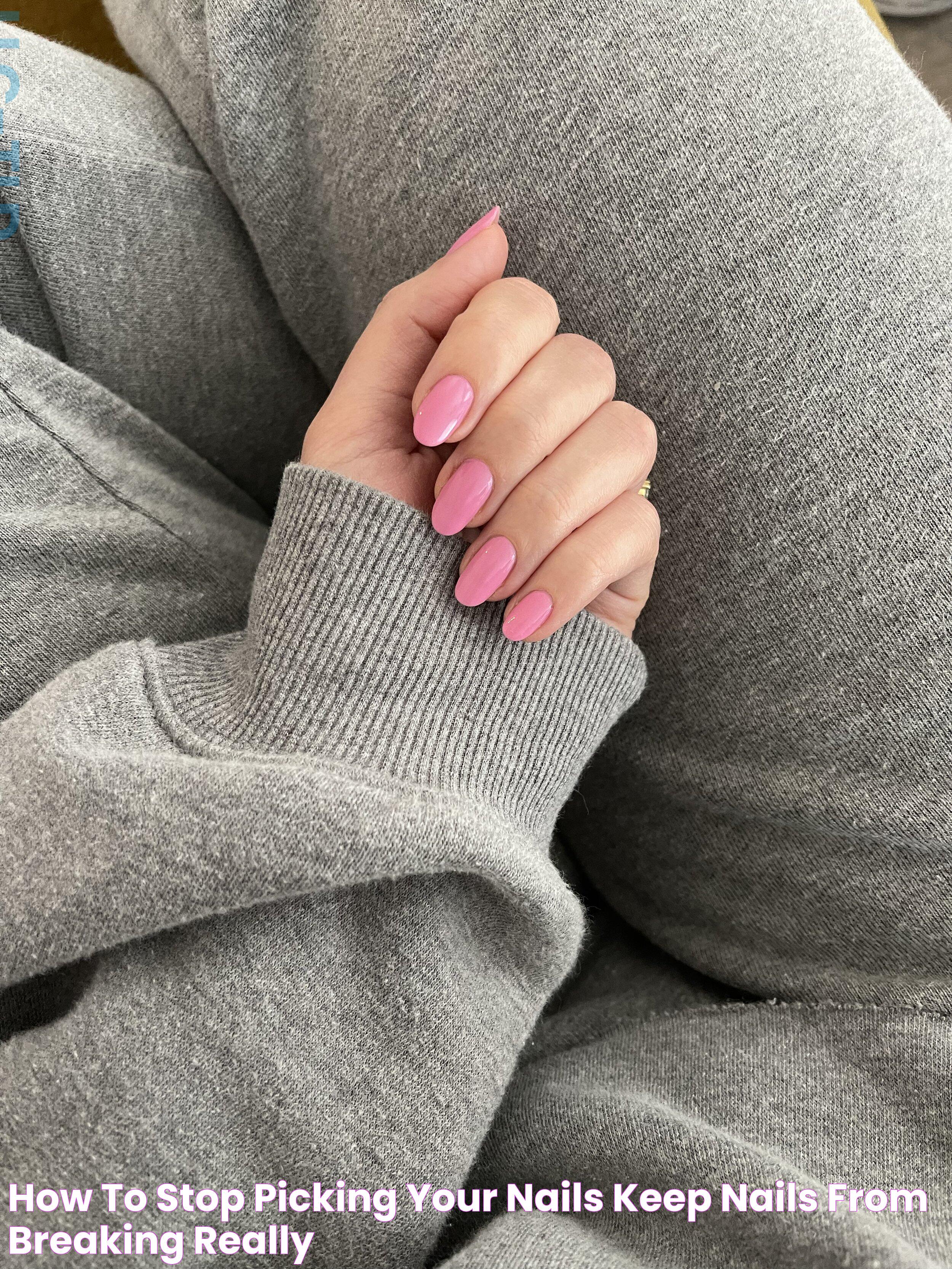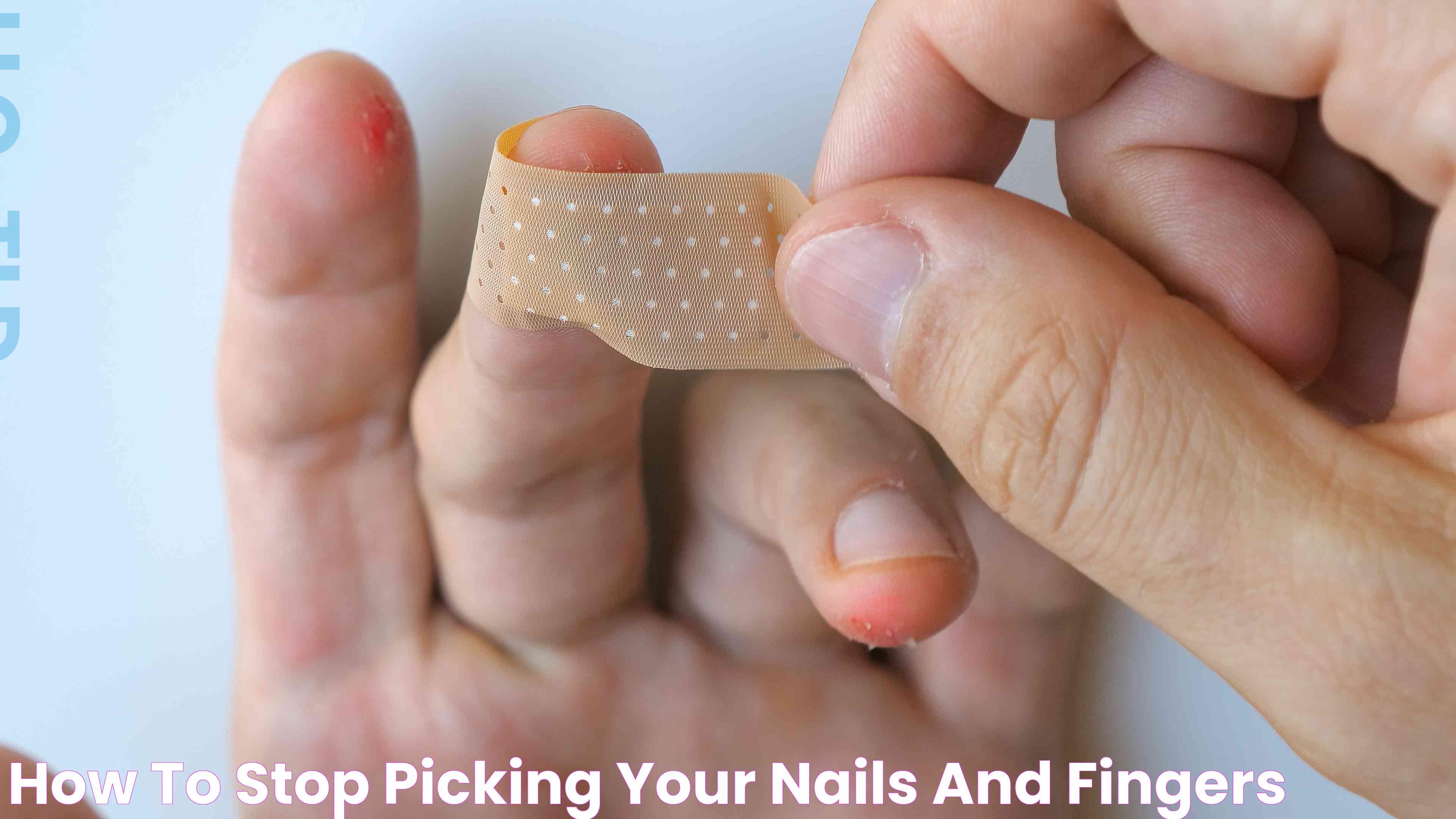Nail care is more than just a cosmetic concern; it's a vital aspect of personal hygiene and overall health. Many people habitually pick their nails, often without considering the potential consequences. This seemingly harmless action can lead to various health issues, from infections to nail deformities. But is it safe to pick your nails? This question has intrigued many, and the answer is more complex than it might appear at first glance.
In this comprehensive guide, we will delve into the practice of nail picking, examining its safety and implications. Understanding the anatomy of your nails, the reasons behind nail picking, and the potential health risks associated with it is crucial. We will explore expert opinions, scientific studies, and practical advice to give you a well-rounded perspective on whether it's safe to pick your nails.
The habit of nail picking can be influenced by various factors, including stress, anxiety, and even boredom. While some may argue that it's a benign activity, it's essential to scrutinize its effects on your health and well-being. Armed with the right knowledge and strategies, you can make informed decisions about your nail care routine, ensuring that you maintain healthy and beautiful nails without compromising your health.
Read also:Secrets Of Sebaceous Cyst Popping What You Need To Know
Table of Contents
- Understanding Nail Anatomy
- Why Do People Pick Their Nails?
- Is it Safe to Pick Your Nails?
- Potential Health Risks of Nail Picking
- Psychological Aspects of Nail Picking
- How to Stop Picking Your Nails
- Nail Care Tips for Healthy Nails
- Professional Treatments for Nail Issues
- Impact on Self-Esteem and Social Interactions
- Alternative Habits to Nail Picking
- Is Nail Picking a Sign of OCD?
- Can Nail Picking Lead to Infections?
- What Do Experts Say About Nail Picking?
- Frequently Asked Questions
- Conclusion
Understanding Nail Anatomy
To fully grasp the implications of nail picking, it's essential to understand the basic anatomy of your nails. Nails are composed of keratin, a tough protein that is also found in your hair and skin. Each nail comprises several parts, including the nail plate, nail bed, cuticle, nail folds, and the lunula.
The nail plate is the visible part of the nail, while the nail bed is the skin beneath the nail plate. The cuticle is a thin layer of dead skin cells at the base of the nail plate, providing a protective barrier against bacteria. Nail folds are the skin around the sides and base of the nail, and the lunula is the whitish, half-moon shape at the nail's base.
Understanding these components is crucial for recognizing how nail picking might affect each part. Damage to any component can lead to a range of issues, from cosmetic concerns to severe infections.
Why Do People Pick Their Nails?
Nail picking is a common behavior, with various underlying causes. Understanding these reasons can help in addressing the habit effectively.
Stress and Anxiety
For many, nail picking is a coping mechanism for stress and anxiety. When faced with a stressful situation, individuals may resort to repetitive behaviors such as nail picking to alleviate tension.
Boredom
Sometimes, people pick their nails simply because they are bored. This habit can develop over time, becoming a mindless activity that provides a temporary distraction.
Read also:The Significance Of 7777 Angel Number Insights And Guidance
Perfectionism
Individuals with perfectionist tendencies might pick their nails in an attempt to achieve a flawless appearance, often leading to counterproductive results.
Is It Safe to Pick Your Nails?
The safety of nail picking largely depends on the extent to which it is practiced. Occasional, gentle grooming may not pose significant risks, but frequent and aggressive picking can lead to a variety of complications.
Potential Damage
Picking your nails can weaken the nail structure, making them more prone to splitting, breaking, and other forms of damage. Consistent picking can also alter the shape of the nails and lead to permanent deformities.
Risk of Infection
One of the most significant risks associated with nail picking is infection. Open wounds caused by aggressive picking can serve as entry points for bacteria and fungi, potentially leading to painful and unsightly infections.
Potential Health Risks of Nail Picking
While nail picking may seem harmless, it can pose several health risks that shouldn't be overlooked.
Skin Infections
Frequent nail picking can lead to open cuts and abrasions on the skin, increasing the risk of bacterial infections such as paronychia.
Fungal Infections
Fungi thrive in warm, moist environments, making the area under the nails a prime location for fungal infections. These infections can cause discoloration, thickening, and even nail loss.
Nail Disorders
Consistent picking can lead to various nail disorders, including nail pitting, ridges, and even onycholysis, where the nail separates from the nail bed.
Psychological Aspects of Nail Picking
Nail picking is not just a physical habit; it can also have psychological implications. Understanding these aspects is crucial for addressing the behavior effectively.
Compulsive Behavior
For some individuals, nail picking may become a compulsive behavior, similar to other body-focused repetitive behaviors like hair pulling or skin picking.
Emotional Impact
The habit can also have an emotional impact, leading to feelings of shame and embarrassment, especially if the nails become visibly damaged.
How to Stop Picking Your Nails
Breaking the habit of nail picking requires a combination of awareness, self-control, and, in some cases, professional intervention. Here are some strategies to help you stop picking your nails:
- Acknowledge the Habit: The first step is to recognize and acknowledge that nail picking is a problem that needs to be addressed.
- Identify Triggers: Understanding what triggers your nail picking can help you develop strategies to avoid or manage those situations.
- Keep Nails Short: Keeping your nails trimmed can reduce the temptation to pick at them.
- Apply Bitter-Tasting Nail Polish: The unpleasant taste can deter you from picking.
- Seek Professional Help: If the habit is severe, consider seeking help from a therapist or counselor who specializes in body-focused repetitive behaviors.
Nail Care Tips for Healthy Nails
Maintaining healthy nails is essential for preventing the urge to pick them and ensuring overall nail health. Here are some tips for keeping your nails in top condition:
Proper Hygiene
Regularly washing your hands and nails helps prevent the buildup of bacteria and fungi, reducing the risk of infections.
Moisturization
Keep your nails and cuticles moisturized to prevent them from becoming dry and brittle.
Regular Trimming
Trim your nails regularly to maintain a neat appearance and reduce the temptation to pick them.
Professional Treatments for Nail Issues
If nail picking has led to significant damage or infection, professional treatment may be necessary. Here are some options to consider:
Dermatologist Consultation
A dermatologist can assess the extent of the damage and recommend appropriate treatments, such as medicated creams or antifungal medications.
Manicures
Regular manicures can help maintain the health and appearance of your nails, making them less prone to damage and picking.
Impact on Self-Esteem and Social Interactions
Nail picking can have a significant impact on self-esteem and social interactions. Damaged nails can lead to feelings of embarrassment and self-consciousness, affecting one's confidence in social situations.
Building Confidence
Working on self-esteem and confidence can help reduce the emotional impact of nail picking. Consider engaging in activities that promote self-care and self-acceptance.
Alternative Habits to Nail Picking
Finding alternative habits to replace nail picking can be an effective strategy in overcoming the behavior. Here are some options to consider:
- Stress Balls: Squeeze stress balls to relieve tension without damaging your nails.
- Fidget Toys: Use fidget toys to keep your hands busy and distracted from picking.
- Mindfulness Techniques: Practice mindfulness to become more aware of your actions and reduce the impulse to pick.
Is Nail Picking a Sign of OCD?
Nail picking can be associated with Obsessive-Compulsive Disorder (OCD), particularly when it becomes a compulsive behavior that is difficult to control. However, not all nail picking is indicative of OCD. It's essential to consult a mental health professional for an accurate diagnosis and appropriate treatment.
Can Nail Picking Lead to Infections?
Yes, nail picking can lead to infections. Open wounds created by picking can allow bacteria and fungi to enter, potentially causing painful and persistent infections. It's crucial to address the habit and maintain good nail hygiene to minimize the risk.
What Do Experts Say About Nail Picking?
Experts in dermatology and psychology agree that nail picking can have negative consequences on both physical and mental health. They recommend addressing underlying triggers, maintaining proper nail care, and seeking professional help if needed to overcome the habit.
Frequently Asked Questions
Why do people pick their nails?
People pick their nails for various reasons, including stress, anxiety, boredom, and perfectionism. It can become a coping mechanism or a habitual behavior over time.
Is it safe to pick your nails occasionally?
Occasional, gentle nail picking may not pose significant risks, but frequent or aggressive picking can lead to damage and infection. It's best to avoid the habit altogether.
Can nail picking cause permanent damage?
Yes, consistent and aggressive nail picking can cause permanent deformities and damage to the nails.
How can I stop picking my nails?
Strategies to stop picking your nails include identifying triggers, keeping nails short, applying bitter-tasting polish, and seeking professional help if necessary.
What are the health risks of nail picking?
Nail picking can lead to skin infections, fungal infections, nail disorders, and emotional distress.
Is nail picking a mental health issue?
Nail picking can be associated with mental health conditions like OCD, especially if it becomes a compulsive behavior. Consulting a mental health professional can provide clarity.
Conclusion
Nail picking is a common habit with potential risks that can affect both physical and mental health. Understanding the reasons behind the behavior, its implications, and strategies for overcoming it can help you maintain healthy nails and improve your overall well-being. By adopting proper nail care techniques and seeking professional guidance when necessary, you can prevent damage and ensure that your nails remain strong and beautiful.

